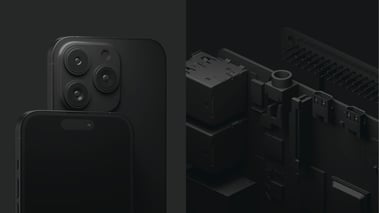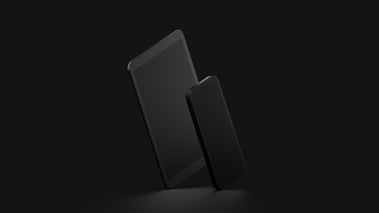Employee Spotlight: Brian Robison, Chief Evangelist and VP of Product at Corellium

 This edition features Brian Robison, our Chief Evangelist and VP of Product, a cybersecurity veteran more than 25 years in the field. He’s worked at industry giants like Tripwire, McAfee, BlackBerry, Citrix, and Cylance, and his cybersecurity career journey has taken him everywhere—from government-secured bunkers to the forefront of cybersecurity innovation.
This edition features Brian Robison, our Chief Evangelist and VP of Product, a cybersecurity veteran more than 25 years in the field. He’s worked at industry giants like Tripwire, McAfee, BlackBerry, Citrix, and Cylance, and his cybersecurity career journey has taken him everywhere—from government-secured bunkers to the forefront of cybersecurity innovation.
Q: You've been in cybersecurity for more than 25 years. What first sparked your passion for the field?
I’ve been in cyber for quite some time. My entire B2B career has been in cyber or cyber-related fields. In the ‘90s, I worked for some of the early modem companies, including Supra. I did the traditional tech support work—banging the phones all day, handling Mac support calls, troubleshooting issues.
That company was later bought by Diamond Multimedia, one of the original video card vendors for PCs. They were at the forefront of 3D video cards and gaming cards, and that was where I really started digging into tech.
Then, one of the international sales managers I worked with at Diamond took a job at a small pre-Series A company called Tripwire in Portland. They had just secured Series A funding and were looking to grow. He asked if I’d be interested in joining as a sales engineer, and I figured—why not?
When I went in for the interview, I found out that they were working on cool stuff—intrusion detection, file integrity monitoring, anti-hacker technology. It was all about detecting system changes and securing environments, and I thought, ‘Alright, I’m in. I can do this.’ That role was really my first step into B2B enterprise security, government sales, and high-security environments. From there, I never looked back.
Q: You've worked at major companies like McAfee, Blackberry, Citrix, and Cylance. What lessons have stuck with you throughout your security career?
I’ve had the opportunity to work at some incredible companies, and throughout my career, I’ve been inside some of the most secure and high-stakes environments in the world. As a quota-carrying sales engineer, I spent time at places like Cheyenne Mountain, NORAD, General Dynamics, nuclear submarine manufacturing facilities in Groton, Connecticut, and the Y-12 nuclear facility with the Department of Energy in Tennessee. I was walking around missile defense air bases, working alongside some of the most security-conscious organizations out there.
That’s where I originally cut my teeth on how these people operate. That experience gave me a deep understanding of how security operates at the highest levels—what these organizations are trying to protect, the threats they face, and the critical importance of both physical and digital security. But one of the biggest lessons I’ve learned is that most companies still focus too much on detection rather than prevention.
I always compare it to fire safety: we know how to build fireproof structures, but instead, we build fire stations closer to our houses so we can respond faster. That’s exactly how security works today—companies pour resources into detection and incident response rather than stopping attacks before they happen. It’s a mindset shift that needs to happen across the industry.
Q: You could have joined any company, what made Corellium stand out?
I wasn’t looking to join just another security company. I wanted something orthogonal to security, where my experience and stories would still be relevant, but the technology itself would be breaking new ground.
That’s when Anthony Ricco, Corellium’s Chief Product Officer, reached out and said, ‘Hey, I’ve been at Corellium for a little bit, and we need product management, technical marketing, sales enablement, evangelism—basically everything wrapped up into one person. And you’re the only one I know who could do this.’
So I took a look at the tech, and immediately, my reaction was, ‘Oh, hell yes.’ Because this was a unique thing. Nobody else had anything like it.
We all witnessed what VMware did to the world in the early 2000s—how virtualization transformed entire industries, making the modern cloud landscape possible. Corellium is doing something just as disruptive, but with Arm-based systems. And that’s exactly what I was looking for.
Q: You're known for making complex cybersecurity topics accessible. How did you develop your storytelling approach?
My original inspiration was Guy Kawasaki, the original evangelist at Apple. I studied his approach to storytelling—how he had to convince engineers to write software for the early Macs so the platform could grow. That idea fascinated me because it applies to everything—you’re not just selling a product, you’re getting people to believe in something new.
For me, it’s all about education, but you have to frame it in a way that anyone can understand. If you’re speaking geek to geek, that’s fine. But if you’re speaking geek to anything else, it’s not going to be received.
I’ve always approached it differently. I don’t care if people remember exactly what I said—I just want them to remember the crazy guy that said it. If they remember me, they’ll remember the idea, and that’s what matters.
Q: What do you think is the biggest challenge facing cybersecurity today?
Too many companies are stuck in this reactive mindset—they want to instrument and visualize attacks, but while they’re busy doing that, the customer is bleeding out on the table.
Instead of actually preventing attacks, organizations pour resources into building massive security teams whose job is to hunt for threats. But that doesn’t protect people—it just means they have more people watching blinking red lights. True security isn’t about reacting after the fact; it’s about helping stop attacks before they happen.
Q: What advice would you give someone starting out in cybersecurity?
Security has to be in your heart. It’s not something you can just learn in a classroom—it has to be experienced. Sure, you can take a class, pass a test, and get a certification, but that doesn’t mean you truly understand it.
The only way to really get it is to learn by doing. You have to experiment, break things, and solve real problems. Until you’re dealing with security challenges every day, you’re never going to truly grasp how it works in the real world.
Q: If you could have dinner with any tech leader, past or present, who would it be?
I mentioned him earlier: Guy Kawasaki. Back in my early days at Tripwire, we actually had the opportunity to meet with him. He would come to the Portland office, and we’d sit down and talk about how to capture people’s interest and get them to care about what we were building. Those conversations shaped a lot of how I approach storytelling in tech today.
Q: What excites you about Corellium’s future?
The potential to virtualize entire vehicles is huge. We have a freaking virtual car running in a virtual world, which has never been done before. That kind of innovation is what drives me.
But beyond the technology, what excites me most is being at the forefront of something that uses good to fight evil. Some of the people we work with—we can’t even talk about what they do. They can’t even really tell us what they do. But I know what they’re doing, and it keeps our friends and family safe. That’s why this work matters.
And what makes Corellium even more exciting is the kind of people we have here. When you bring together those who want to break the world to understand it and those who want to protect the world, you get something truly powerful. That convergence is what makes this space so dynamic, and it’s what keeps me passionate about the work we do every day.
Join a Team That's Revolutionizing Mobile Security
Want to work alongside experts like Brian at Corellium? Check out our open positions at Corellium Careers.
Keep reading

Advancing Automotive Software Development and Mobile Security Testing with Corellium

Mobile Application Development Isn’t Just for Phones – Enable More Thorough Testing

